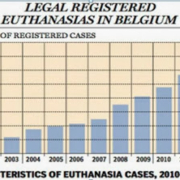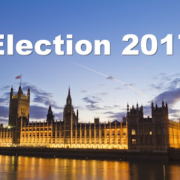Pro-euthanasia campaigners use of celebrities to boost support may well fuel more suicides
 Columnist Melanie Philips this week, in an article titled ‘Why are the Left (and the BBC) so keen to promote this ghoulish culture of death?’ highlights the growing use of celebrity endorsement for a change in the law.
Columnist Melanie Philips this week, in an article titled ‘Why are the Left (and the BBC) so keen to promote this ghoulish culture of death?’ highlights the growing use of celebrity endorsement for a change in the law.
First, we learned that the BBC plans to screen a documentary this summer in which novelist and Alzheimer’s sufferer Terry Pratchett advocates assisted suicide.The programme features footage of a man with motor neurone disease travelling to the Swiss euthanasia clinic Dignitas and being shown dying on screen.
Hard on the heels of this snuff movie came the sickening news that a video featuring notorious assisted suicide campaigner Dr Philip Nitschke, in which he demonstrates how to help people kill themselves, is being shown to schoolchildren in British classrooms.
And now the Star Trek actor Sir Patrick Stewart, who apart from being diagnosed with coronary heart disease five years ago is a healthy 70-year-old, suddenly announces his wish to be allowed an assisted death.
This is all part of the recent move by Dignity in Dying (formerly the Voluntary Euthanasia Society) to fuel support for its campaign by involving celebrities. Pratchett and Stewart are both DID patrons and Philip Nitschke, like the others, is an enthusiast for new legislation.
In a recent letter to supporters (21 February) titled ‘Sir Patrick Stewart, Ian McEwan and Chris Broad join campaign as Patrons’ DID trumpeted its success in gaining fresh celebrity support.
New supporters continue to join our campaign for a change in the law on assisted dying. Today we are pleased to announce that actor Sir Patrick Stewart, author Ian McEwan and former England cricketer Chris Broad have all pledged their support by joining as Dignity in Dying’s newest Patrons.
Further new arrivals include Simon Weston and fashion designer Jasper Conran, adding to an ever growing list of high profile support for change.
You can view the entire list of Patrons on our website and read why they feel a change in the law needs to happen.
The spate of new celebrity stories last weekend appears to be part of the same campaign to boost popular support for assisted suicide through bombarding the public with personal testimonies from those who they admire for their achievements in sport, media or literature.
We are being subjected to these stories because Lord Falconer’s discredited commission is about to hear new ‘evidence’ today (20 April). DID set up this private commission, funded by their patron Terry Pratchett, to put pressure on parliament, but because so many people have been refusing to give evidence to it (as it is unnecessary, unbalanced and lacking in transparency) they have been encouraging their own supporters to visit the website to register their approval for a change in the law.
DID’s most recent letter to supporters this week (18 April) builds on the celebrity theme and is aimed at encouraging recruitment to their cause:
We were delighted to read stories this weekend of Sir Terry Pratchett fronting a BBC2 documentary on assisted dying, Sir Patrick Stewart on his reasons for supporting a change in the law, and England cricketer Chris Broad on why he will give evidence to the Commission on Assisted Dying this Wednesday.
All are Patrons of Dignity in Dying and stories like these really help build momentum for our campaign. Please help us reach new supporters while assisted dying is so high on the media agenda by forwarding this email to a friend, liking us on Facebook or following us on Twitter.
And remember, there are only two weeks until the Commission on Assisted Dying deadline for evidence, please have your say by completing their online questionnaire.
I was interested to see Alex Schadenberg’s comments on this new celebrity phenomenon in a blog earlier this week. Alex heads up the Euthanasia Prevention Coalition in Canada:
It is interesting that the media considers an actor commenting on assisted suicide to be newsworthy. I guess selling newspapers is more important than finding an objective and educated response.
The reports fail to present the issue accurately. Legalizing euthanasia and/or assisted suicide create a right to be killed or allow a physician to actually cause or be involved with causing your death, it is not about a right to die.
There is another issue with the complicity of the media in promoting euthanasia and assisted suicide cases in their reporting. The reality of the copy cat suicide effect is well known and that is why the World Health Organization established a set of guidelines for the media to help prevent suicide.
People, like Patrick Stewart, do raise legitimate concerns about the care of people who are dying. These concerns are properly dealt with by a society that improves the care of the dying, improves the care and attitude towards people with disabilities, maintains an effective suicide prevention strategy and understands the scourge and the need to prevent elder abuse.
The WHO report Alex refers to (World Health Organization’s Preventing Suicide: A Resource for Media Professionals) makes the point that ‘the degree of publicity given to a suicide story is directly correlated with the number of subsequent suicides. Cases of suicide involving celebrities have had a particularly strong impact’.
This is backed up by a major review of 42 studies on the impact of publicized suicide stories in the media on the incidence of suicide in the real world published in the Journal of Epidemiology and Community Health in 2003. This found that ‘studies measuring the effect of either an entertainment or political celebrity suicide story were 14.3 times more likely to find a copycat effect than studies that did not. Studies based on a real as opposed to fictional story were 4.03 times more likely to uncover a copycat effect.’
Suicide contagion is real, and it does not occur only in young people.
DID, their celebrity patrons and the media outlets who are giving them a platform need to be aware that, on the basis of the available evidence, their activities are likely to lead to more vulnerable people being pushed over the edge into taking their own lives.
I wonder if they have considered that?












Leave a Reply
Want to join the discussion?Feel free to contribute!